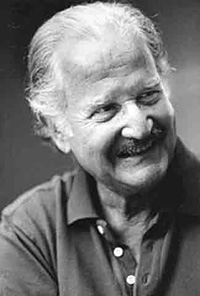 |
 |
 |
 Entertainment | Books | October 2007 Entertainment | Books | October 2007  
Fuentes Discusses Mexican Identity
 Tasnim Shamma - Daily Princetonian Tasnim Shamma - Daily Princetonian
go to original


| | Carlos Fuentes |
Carlos Fuentes, a renowned Mexican novelist, scholar and diplomat, presented his view of Mexican history and national identity at a recent lecture at Princeton University.

Fuentes traced the social, political and economic development of Mexico in a talk called "A Panoramic View of the History of Mexico." Fuentes began his talk by describing Mexican mythology, focusing on the question of identity that pervades the country's lore from the very beginning of the civilization to the present day, a theme he also often visits in his many novels.

"From the beginning we asked ourselves questions of identity: Who are we? What do we remember? What do we desire?" Fuentes said. "We also asked ourselves the question of justice: To whom do these lands belong?"

Fuentes described the pivotal role of the Mexican Revolution in its history, saying that the Institutional Revolutionary Party brought political stability and a sense of permanence to the country.

Fuentes, who was a visiting professor and fellow of the Humanities council at Princeton in 1979, described yesterday's visit as a homecoming. He has also taught at Cambridge, Harvard and Brown. Firestone Library serves as the archival home for Fuentes' works with 200 boxes of his journals, editorials, letters to international figures, drafts of novels, notebooks from his time in elementary school, photos and audiotapes.

Fuentes' long career as a diplomat and director of international cultural relations for the Mexican government put him in a position to observe the impact imperial powers had on the development of the country. Mexico became open to foreign intervention and lost half of its territory as the United States expanded across North America during the 19th century.

"The Mexican Revolution was a real revolution," Fuentes said, adding that Mexicans gained "national self-knowledge" and a "discovery of cultural continuity which had never been fully recognized in the political and economic history of the country." Fuentes also said that the revolution allowed Mexico to have social justice and maintain national unity against U.S. pressure.

Despite the gains from the revolution, Fuentes pointed out that much had yet to be done to strengthen Mexico, such as integrating minority groups into the population and creating more job opportunities.

When an audience member asked Fuentes to address the issue of Mexican immigration to the United States, Fuentes said that the United States "was once an empty country."

"The so-called American Indians came from somewhere else," he said. "The Europeans were immigrants. This is a country of migrants. When they are here, they should be respected as workers doing the jobs Americans don't want to do."

He stressed that Mexicans had a "greater responsibility to keep [immigrants to the United States] in our country and offer them work and better social conditions." | 
 | |
 |



